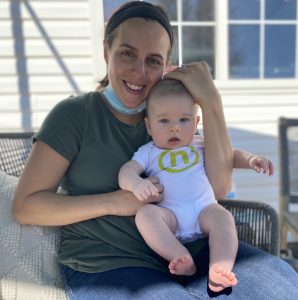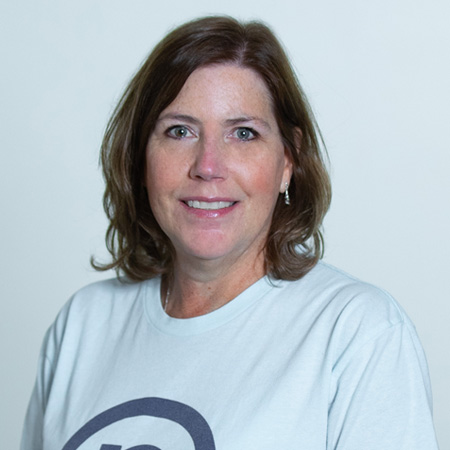One Associate’s Passion Leads to Enhanced Benefits for All Associates
 One of Nelnet’s core values is creating an awesome work environment. Executive leadership also encourages innovation at all levels—and urges associates to bring their ideas forward to help effectively drive innovation.
One of Nelnet’s core values is creating an awesome work environment. Executive leadership also encourages innovation at all levels—and urges associates to bring their ideas forward to help effectively drive innovation.
This call for innovative ideas applies not only to those that relate to business solutions and meeting customer needs but to all ideas—including those that improve our company culture. This was evident when Nelnet Diversified Services IT Manager Alex Ricaurte successfully campaigned for better parental leave benefits during her second and third trimesters of pregnancy.
The Spark of the Idea
When she was 12 weeks pregnant and with a toddler at home, Ricaurte told her colleague, Jill Duell, how stressed she was about having to bank all her earned time off (ETO) for doctor’s appointments and additional time off after the baby came. Ricaurte said she wanted to advocate for Nelnet to provide more than seven weeks’ maternity leave. At the time, Nelnet offered paid leave after a one-week elimination period, followed by two weeks paid parental leave and additional time available via short-term disability concurrent with Family Medical Leave Act (FMLA).
Duell noted that she had already submitted the idea to the Nelnet Diversified Services Associate Engagement and Experience Committee and would check the status. When the two found that the idea needed to go next to the division’s Culture Office, Ricaurte and Duell invited Nelnet Diversified Services Director of Culture Jessica Schumacher to lunch. Schumacher was interested in helping them pursue enhanced leave. Soon after, the Parental Leave Committee was formed, consisting of Ricaurte and a group of three other women at various times: Duell, Nicole Francavilla, and Danielle Paolini.
Moving the Idea Forward
The Parental Leave Committee began meeting anywhere from zero to 1.5 hours per week. The division’s Culture Office invited them to lean on them for questions as they progressed with their plans. They also connected with Nelnet Diversified Services Chief Information Officer John Turner, who invited the group to run things by him. As Ricaurte noted, “He was the closest I could get to the executives and could help us understand what would be important to them.”
The Culture Office suggested the committee would need to research and present, among other things:
- A clear ask—and be able to justify it.
- A projected investment from Nelnet.
- A chart showing Nelnet’s current and proposed policies versus competitors.
The Parental Leave Committee looked not only at the parental policies of other large premier employers, but also those of other companies that compete with Nelnet for associates based on their location, size, market strategy, workforce demographic, and reputation.
They began asking questions internally, using ServiceNow and Data Analytics to find the attrition rate of associates using maternity and parental leave versus the organization’s general attrition rate; the population of child-bearing age at Nelnet; the number of men vs. women in Nelnet’s workforce; and more. All of this information was essential in providing a projected investment and cost.
Creating the Ask

To form their detailed ask, the Parental Leave Committee used recommendations from the American Public Health Association, which endorses no less than 12 weeks of maternity leave for women. They also relied on their own pregnancy experiences and reached out to many other associates at Nelnet, both female and male.
A major part of the committee’s ask was eliminating the need for associates to use a week of ETO to qualify for paid medical leave (PML). Making a change to eliminate the qualifying week for PML for maternity leave meant eliminating the qualifying week for any PML—for any associate.
Presenting the Idea
The Parental Leave Committee presented to the Nelnet Diversified Services Culture Committee when Ricaurte was 30 weeks pregnant. The group addressed feedback it received and presented the following week at the Enterprise Culture Council meeting, which Chief Executive Officer Jeff Noordhoek attended. Following this presentation, Noordhoek pushed for the Parental Leave Committee to pitch their proposal at the following week’s Executive Communication Meeting.
“The parental leave committee did an excellent job of researching the facts, data, and costs associated with parental leave, and made a compelling argument for a change at Nelnet. Virtually all great ideas for change come from within the organization,” emphasized Noordhoek.
At this point, the proposed parental leave request morphed into an enhanced leave implementation—and People Services took over the project. The executives asked Director of Benefits Administration Jamie Fountain—within less than a week—to present what could be done to address the request. Fountain’s proposal was approved the day she presented it. At 34 weeks, Ricaurte was informed change was coming, and at 35 weeks pregnant, she had the satisfaction of seeing her idea come to fruition when Nelnet announced enhanced leave changes that would go into effect November 1 (her due date was in early December).

- ECC Parental Leave Pitch – 9/25/2022
- Executive Team Pitch – 10/3/2022
- Project hand off ot People Services – 10/3/2022
- PS Executive Proposal – 10/10/2022
- Enhanced paid leave programs approved – 10/10/2022
- Implementation Date – 11/1/2022
Executives appreciated several things about the way the Parental Leave Committee pitched their idea. First, they appreciated having this concern brought to their attention. As Schumacher pointed out, “As the execs said, ‘This is the right thing to do, but we just didn’t even think about it.’”
If you’re passionate about something like Alex was, don’t hesitate. The executives are open to ideas, our executive team is not saying they’re perfect. Sometimes they need you to point it out. There are good ideas everywhere. It was one of my favorite things about this.
Ricaurte emphasized, “I think Nelnet would have gotten there eventually; I just sped things along.” She had a crucial due date that she was working toward.
As Ricaurte explained, “The executives appreciated that we gave them utilization and cost numbers.” Understanding that the executives couldn’t necessarily relate to stories of prenatal conditions, the Parental Leave Committee made a point of demonstrating this initiative’s role in contributing to the core value of creating an awesome work environment, taking care of associates, and helping make Nelnet a premier employer—ideals that are essential to the executive team.
Nelnet’s Leave Enhancements
The Parental Leave Committee was surprised by Nelnet’s response to their request. They had requested eight weeks of PML for all delivery types (they received 10 weeks) and four weeks of parental leave, which they received. Other policies People Services had been considering revising were also updated with this leave enhancement.
The eligibility period (the number of months an associate needs to be employed before being eligible) for PML leave was reduced. The qualifying week for PML was eliminated, reducing the need for associates to use ETO or unpaid time before PML kicked in. Both birthing and non-birthing parents received more parental leave, and adoption and foster placement leave were also enhanced with the plan changes.
Most policy changes are implemented on January 1, but People Services went to great effort to implement these important changes within two weeks—and then they backdated the policy seven weeks to include numerous associates whose leave was impacted.
Reaction of Associates

At Nelnet’s 2023 All Director’s Meeting, Ricaurte’s actions as a change agent were used to help demonstrate the value of associates bringing their ideas forward. Schumacher said, “[Nelnet Diversified Services Risk and Compliance Director] Becky Keith asked everyone to stop and clap specifically for Alex for her role in bringing about the leave enhancements.”
With Nelnet backdating the leave enhancement changes, Brandy Luna, Director of Recruiting, was able to call people who were already on medical, maternity, or parental leave. When they were told about the positive changes to their leave and its impact on their ETO and pay, Luna said several of them cried with happiness.
Ricaurte was also asked to present her campaign for change at a July 2023 Spark meeting, helping to show how receptive Nelnet is to associates’ ideas and how much positive change can occur when one associate’s passion translates to action. There was an outpouring of heartfelt and appreciative comments by associates following her presentation in the Teams channel, demonstrating how much associates appreciated the enhancements made to all PML—not just for those of childbearing age.
As Ricaurte said, “I could have just complained about it to others like I did with my first child. This time, I decided to do something about it.” Seeing what Ricaurte did and the change it created at Nelnet was impactful; it was also eye-opening for many Nelnet associates who are now more likely to pursue moving forward their own ideas.



